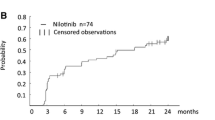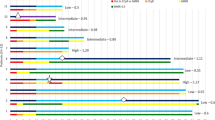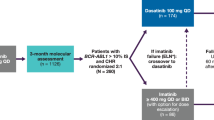Abstract
To determine whether a lower imatinib dose could minimize toxicity while maintaining the molecular response (MR), imatinib dose was reduced to 300 mg daily in 43 patients with chronic myeloid leukemia (CML) in sustained deep molecular response to first-line imatinib 400 mg daily. At the time of dose reduction, median duration of the deep response was 4.1 (interquartile range (IQR) 2.2–5.9) years; molecular response was MR4, MR4.5, and MR5 of the international scale in 6, 28, and 9 patients, respectively. Toxicity grade was 1, 2, and 3 in 28, 8, and 1 patients, respectively; 6 patients underwent dose reduction without having side effects. With a median of 1.6 (IQR 0.7–3.2) years on imatinib 300 mg daily, only one patient lost the deep molecular response to MR3. At the last follow-up, response was MR3, MR4, MR4.5, and MR5 in 1, 3, 9, and 30 patients, respectively. Toxicity improvement was observed in 23 (62.2 %) of the 37 patients with side effects, decreasing to grade 0 in 20 of them. All but one anemic patients improved (p = 0.01), the median Hb increase in this subgroup of patients being 1 g/dL. In CML patients with sustained deep response to the standard imatinib dose, reducing to 300 mg daily significantly improves tolerability and preserves efficacy.


Similar content being viewed by others
References
Druker BJ, Guilhot F, O’Brien SG et al (2006) Five-year follow-up of patients receiving imatinib for chronic myeloid leukemia. N Engl J Med 355:2408–2417
Deininger M, O’Brien SG, Guilhot F et al (2009) International randomized study of interferon vs STI571 (IRIS) 8-year follow-up: sustained survival and low risk for progression or events in patients with newly diagnosed chronic myeloid leukemia in chronic phase (CML-CP) treated with imatinib. Blood 114:1126 (abstract)
Pfirrmann M, Baccarani M, Saussele S et al (2016) Prognosis of long-term survival considering disease-specific death in patients with chronic myeloid leukemia. Leukemia 30:48–56
Hochhaus A, Saglio G, Hughes TP et al (2016) Long-term benefits and risks of frontline nilotinib vs imatinib for chronic myeloid leukemia in chronic phase: 5-year update of the randomized ENESTnd trial. Leukemia 30:1044–1054
Jabbour E, Kantarjian HM, Saglio G et al (2014) Early response with dasatinib or imatinib in chronic myeloid leukemia: 3-year follow-up from a randomized phase 3 trial (DASISION). Blood 123:494–500
De Lavallade H, Apperley JF, Khorashad JS et al (2008) Imatinib for newly diagnosed patients with chronic myeloid leukemia: incidence of sustained responses in an intention-to-treat analysis. J Clin Oncol 26:3358–3363
Cervantes F, López-Garrido P, Montero MI et al (2010) Early intervention during imatinib therapy in patients with newly diagnosed chronic-phase chronic myeloid leukemia: a study of the Spanish PETHEMA group. Haematologica 95:1317–1324
Efficace F, Baccarani M, Breccia M et al (2013) Chronic fatigue is the most important factor limiting health-related quality of life of chronic myeloid leukemia patients treated with imatinib. Leukemia 27:1511–1519
Guérin A, Chen L, Ionescu-Ittu R, Marynchenko M, Nitulescu R, Hiscock R, Keir C, Wu EQ (2014) Impact of low-grade adverse events on health-related quality of life in adult patients receiving imatinib or nilotinib for newly diagnosed Philadelphia chromosome positive chronic myelogenous leukemia in chronic phase. Curr Med Res Opinion 30:2317–2328
Flynn KE, Atallah E (2016) Quality of life and long-term therapy in patients with chronic myeloid leukemia. Curr Hem Malign Rep 11:80–85
Hughes TP, Lipton JH, Spector N et al (2014) Deep molecular responses achieved in patients with CML-CP who are switched to nilotinib after long-term imatinib. Blood 124:729–736
Hochhaus A, Baccarani M, Deininger M et al (2008) Dasatinib induces durable cytogenetic responses in patients with chronic myelogenous leukemia in chronic phase with resistance or intolerance to imatinib. Leukemia 22:1200–1206
Gambacorti-Passerini C, Brümmendorf TH, Kim DW et al (2014) Bosutinib efficacy and safety in chronic phase chronic myeloid leukemia after imatinib resistance or intolerance: minimum 24-month follow-up. Am J Hematol 89:732–742
Faber E, Divoká M, Skoumalová I, Novák M, Marešová I, Mičová K, Friedecký D, Adam T, Jarošová M, Indrák K (2015) A lower dosage of imatinib is sufficient to maintain undetectable disease in patients with chronic myeloid leukemia with long-term low-grade toxicity of the treatment. Leuk & Lymph 57:1–6
Cross NCP, White HE, Colomer D et al (2015) Laboratory recommendations for scoring deep molecular responses following treatment for chronic myeloid leukemia. Leukemia 29:999–1003
Mahon FX, Réa D, Guilhot J et al (2010) Discontinuation of imatinib in patients with chronic myeloid leukaemia who have maintained complete molecular remission for at least 2 years: the prospective, multicentre Stop Imatinib (STIM) trial. Lancet Oncol 11:1029–1035
Ross DM, Branford S, Seymour JF et al (2013) Safety and efficacy of imatinib cessation for CML patients with stable undetectable minimal residual disease: results from the TWISTER study. Blood 122:515–522
Takahashi N, Kyo T, Maeda Y et al (2012) Discontinuation of imatinib in Japanese patients with chronic myeloid leukemia. Haematologica 97:903–906
Saussele S, Richter J, Guilhot J et al (2014) First interim analysis of a pan-European stop trial using standardized molecular criteria: results of the EURO-SKI trial. Haematologica 99:792 (abstract)
Russo D, Martinelli G, Malagola M et al (2013) Effects and outcome of a policy of intermittent imatinib treatment in elderly patients with chronic myeloid leukemia. Blood 121:5138–5144
Guilhot F, Druker B, Larson RA, Gathmann I, So C, Waltzman R, O’Brien SG (2009) High rates of durable response are achieved with imatinib after treatment with interferon alpha plus cytarabine: results from the International Randomized Study of Interferon and STI571 (IRIS) trial. Haematologica 94:1669–1675
Acknowledgments
This study has been supported in part by grants RD012/0036/0004 and RD012/0036/0010 from the Instituto de Salud Carlos III, Spanish Ministry of Health and by AMPILE.
Author information
Authors and Affiliations
Consortia
Corresponding author
Ethics declarations
This collaborative study was performed in seven centers within the framework of the Spanish CML Group. It was approved by the Spanish Drug Agency, and since the intervention was considered as routine clinical practice to minimize imatinib side effects, patients’ signed informed consent was not deemed necessary by the Ethics Committee for approval.
Conflict of interest
The authors declare that they have no conflict of interest.
Rights and permissions
About this article
Cite this article
Cervantes, F., Correa, JG., Pérez, I. et al. Imatinib dose reduction in patients with chronic myeloid leukemia in sustained deep molecular response. Ann Hematol 96, 81–85 (2017). https://doi.org/10.1007/s00277-016-2839-z
Received:
Accepted:
Published:
Issue Date:
DOI: https://doi.org/10.1007/s00277-016-2839-z




